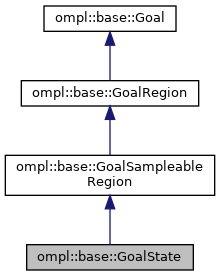ompl::base::GoalState Class Reference
Definition of a goal state. More...
#include <ompl/base/goals/GoalState.h>
Inheritance diagram for ompl::base::GoalState:

Public Member Functions | |
| GoalState (const SpaceInformationPtr &si) | |
| Create a goal representation that is in fact a state | |
| void | sampleGoal (State *st) const override |
| Sample a state in the goal region. | |
| unsigned int | maxSampleCount () const override |
| Return the maximum number of samples that can be asked for before repeating. | |
| virtual double | distanceGoal (const State *st) const override |
| Compute the distance to the goal (heuristic) | |
| void | print (std::ostream &out=std::cout) const override |
| Print information about the goal data structure to a stream. | |
| void | setState (const State *st) |
| Set the goal state. | |
| void | setState (const ScopedState<> &st) |
| Set the goal state. | |
| const State * | getState () const |
| Get the goal state. | |
| State * | getState () |
| Get the goal state. | |
 Public Member Functions inherited from ompl::base::GoalSampleableRegion Public Member Functions inherited from ompl::base::GoalSampleableRegion | |
| GoalSampleableRegion (const SpaceInformationPtr &si) | |
| Create a goal region that can be sampled. | |
| bool | canSample () const |
| Return true if maxSampleCount() > 0, since in this case samples can certainly be produced. | |
| virtual bool | couldSample () const |
| Return true if samples could be generated by this sampler at some point in the future. By default this is equivalent to canSample(), but for GoalLazySamples, this call also reflects the fact that a sampling thread is active and although no samples are produced yet, some may become available at some point in the future. | |
 Public Member Functions inherited from ompl::base::GoalRegion Public Member Functions inherited from ompl::base::GoalRegion | |
| GoalRegion (const SpaceInformationPtr &si) | |
| Create a goal region. | |
| bool | isSatisfied (const State *st) const override |
| Equivalent to calling isSatisfied(const State *, double *) with a nullptr second argument. | |
| bool | isSatisfied (const State *st, double *distance) const override |
| Decide whether a given state is part of the goal region. Returns true if the distance to goal is less than the threshold (using distanceGoal()) | |
| void | setThreshold (double threshold) |
| Set the distance to the goal that is allowed for a state to be considered in the goal region. | |
| double | getThreshold () const |
| Get the distance to the goal that is allowed for a state to be considered in the goal region. | |
 Public Member Functions inherited from ompl::base::Goal Public Member Functions inherited from ompl::base::Goal | |
| Goal (const Goal &)=delete | |
| Goal & | operator= (const Goal &)=delete |
| Goal (SpaceInformationPtr si) | |
| Constructor. The goal must always know the space information it is part of. | |
| virtual | ~Goal ()=default |
| Destructor. | |
| template<class T > | |
| T * | as () |
| Cast this instance to a desired type. More... | |
| template<class T > | |
| const T * | as () const |
| Cast this instance to a desired type. More... | |
| GoalType | getType () const |
| Return the goal type. | |
| bool | hasType (GoalType type) const |
| Check if this goal can be cast to a particular goal type. | |
| const SpaceInformationPtr & | getSpaceInformation () const |
| Get the space information this goal is for. | |
| virtual bool | isStartGoalPairValid (const State *, const State *) const |
| Since there can be multiple starting states (and multiple goal states) it is possible certain pairs are not to be allowed. By default we however assume all such pairs are allowed. Note: if this function returns true, isSatisfied() need not be called. | |
Protected Attributes | |
| State * | state_ |
| The goal state. | |
 Protected Attributes inherited from ompl::base::GoalRegion Protected Attributes inherited from ompl::base::GoalRegion | |
| double | threshold_ |
| The maximum distance that is allowed to the goal. By default, this is initialized to the minimum epsilon value a double can represent. | |
 Protected Attributes inherited from ompl::base::Goal Protected Attributes inherited from ompl::base::Goal | |
| GoalType | type_ |
| Goal type. | |
| SpaceInformationPtr | si_ |
| The space information for this goal. | |
Detailed Description
Definition of a goal state.
Definition at line 112 of file GoalState.h.
The documentation for this class was generated from the following files:
- ompl/base/goals/GoalState.h
- ompl/base/goals/src/GoalState.cpp